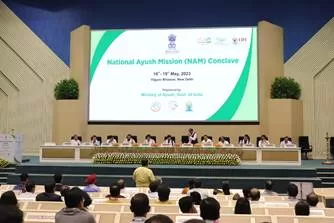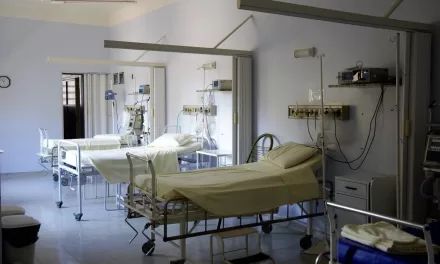
The two-day National Ayush Mission Conclave began with a commitment from the Ministry of Ayush and the Ministry of Health and Family Welfare to priorities ‘Integrative Health’ for the health and wellness of the public at large. Union cabinet minister of Ayush and Ports, Shipping & Waterways Shri Sarbananda Sonowal inaugurated the conclave in the presence of chief guest Dr. Mansukh Mandaviya, Union Minister of Health & Family Welfare.
On this occasion, two ICT initiatives of the Ministry of Ayush were launched. E-Learning Management System (eLMS) was launched by Shri Sarbananda Sonowal and Comprehensive AHMIS, an upgraded EHR system was launched by Dr. Mansukh Mandaviya. Minister of State for Ayush Dr. Munjpara Mahendrabhai along with Health and Ayush Ministers from Uttar Pradesh, Madhya Pradesh, Haryana, Himachal Pradesh, Goa, Jharkhand, Uttarakhand, Assam, Mizoram, Nagaland, Arunachal Pradesh and other states including representatives of Jammu & Kashmir were also present. Union Minister of Ayush Shri Sarbananda Sonowal also administered the ‘Lifestyle for Environment pledge’ to the august gathering.
While presiding over the function Shri Sonowal said, ‘Hon’ble Prime Minister Shri Narendra Modi has encouraged Ayush and Health and Family Welfare Ministry to work in unison for Health and Wellness. India will have to lead the world on this front. As both the Ministries are working incessantly, so our resolve and strength have grown manifold. Recognising the strength of Indian Traditional Medicines Systems, WHO has too bestowed India with the placement of a WHO-GCTM centre in Jamnagar.
Dr. Mansukh Mandaviya placed greater emphasis on Integrative Medicine and said today’s primary need is to make every citizen of India healthy. Both Ministries will soon come out with an “Integrative Health” policy.
Dr. Mandaviya added that the traditional medicine system of India is our strength and now the world has fully accepted it. He mentioned that Yoga is best for wellness and quoted that the majority of the Japanese population regularly practice Yoga in some or other form for health and wellness benefits.
Minister of Ayush for Ayush Dr. Munjpara Mahendrabhai said, ’Ayush with its holistic and integrative approach, can significantly contribute to reducing the burden of disease in India.’
Vaidya Rajesh Kotecha, Secretary, Ministry of Ayush welcomed all and said that Ayush systems by virtue of their holistic approach have an edge in dealing with problems focussed on the primary prevention of diseases.
Immediately after the inaugural session, a roundtable discussion on strengthening the Ayush services in the country through National Ayush Mission’ was held. Ministers and senior health officials from participating states and UTs acknowledged the impact that HWCs is bringing in the public health delivery system of India. During the discussion ministers also mentioned how the Ayush system has been developing in their states and has generated employment. Kavita Garg, Joint Secretary, Ministry of Ayush presented an overview of the National Ayush Mission.
National Ayush Mission (NAM) is the flagship program of the Ministry of Ayush and with the active cooperation of states and UTs governments; it is changing the Health and wellness landscape in states. The two days conclave (18th and 19th May 2023) will pave the way for better coordination among stakeholders and strengthen AHWCs functioning.
During the conclave, subject experts from participating states will deliberate on various aspects of National Ayush Mission (NAM), focused on enhanced efficiency in budget absorption under NAM and institutionalization for improvised execution of the scheme, enabling the better supply of medicines to Ayush Health Facilities, capacity building for Ayush and up-gradation of Ayush Health Wellness centers (AHWCs), strengthening the education ecosystem in Ayush to strengthen Public Health and technological integration for research and quality assurance in Ayush public healthcare.
The flagship program National Ayush Mission was launched in 2014 and it has played a crucial role in preserving and promoting India’s traditional systems of medicine and their integration into the mainstream healthcare system. It aims to enhance the availability, accessibility, and quality of Ayush healthcare services across the country through Ayush Health Wellness Centers (AHWCs) as part of the Government of India’s Ayushman Bharat scheme.
Union Cabinet has approved the operationalization of 12,500 Ayush HWCs by upgrading existing Ayush Dispensaries/Health Sub-centre through State/UT Governments in centrally sponsored scheme mode and under the broad umbrella of National Ayush Mission (NAM) in a phased manner. Till date more than 8500 AHWCs have been setup across India and are serving the communities.











